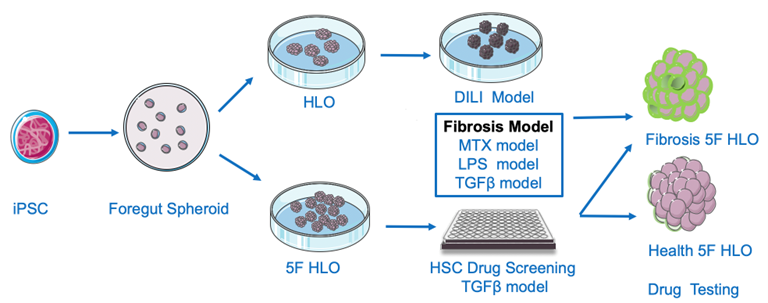A recent study by Prof. DING Qiurong’s group from the Shanghai Institute of Nutrition and Health (SINH), Chinese Academy of Sciences (CAS) developed a method for drug safety assessment and high-throughput screening of anti-fibrotic drugs using human liver organoids (HLOs) derived from human pluripotent stem cells (hPSCs).
The high failure rate of new drug development have been well recognized. Relying on pre-clinical data obtained from animal experiments will inevitably cause low concordance with human clinical trials, resulting in a high failure rate in drug development. There is thus an urgent need to develop in vitro liver models that can accurately predict the toxicity and efficacy of drug candidates. Human liver organoids derived from hPSCs provide such a viable solution.
The researchers from SINH established an HLO system derived from human pluripotent stem cells. HLOs contain multiple cell lineages in the liver, such as hepatocytes, cholangiocytes, stellate cells, and kupffer cells. This makes HLOs a potential solution for modeling a diversity of phenotypes associated with drug-induced liver injury (DILI), including steatosis, fibrosis, and immune responses. Phenotypic changes in HLOs after treatment with tool compounds such as acetaminophen, fialuridine, methotrexate, or TAK-875 showed high concordance with human clinical data in drug safety testings. Moreover, HLOs were able to model liver fibrogenesis induced by TGFβ or LPS treatment.
The researchers further devised a high-content analysis system and established a high-throughput anti-fibrosis drug screening system using HLOs. They identified SD208 and Imatinib as potential compounds that can significantly suppress fibrogenesis induced by TGFβ, LPS, or methotrexate.
This research developed a platform with hPSC-derived HLOs for drug safety assessment and high-throughput screening of antifibrotic drugs.
Future efforts will be focusing on the detailed functional profile of the liver organoid model and optimization of the drug screening system. Exploration of the detailed mechanisms of anti-fibrotic drugs in combination with the HLO liver fibrosis model and humanized mouse model will be helpful to accelerate the applications of HLOs in clinical and pre-clinical studies.
This research entitled “Modeling drug-induced liver injury and screening for anti-hepatofibrotic compounds using human PSC-derived organoids” was published online in Cell Regeneration on March 3, 2023. It was supported by grants from the National Natural Science Foundation of China, the Strategic Pioneer Science and Technology Special Project of CAS, the Science and Technology Commission of Shanghai Municipality, the China Postdoctoral Science Foundation, and the Youth Innovation Promotion Association of CAS, as well as the Public Technology Platform of SINH.

Development of human PSC-derived liver organoid for drug hepatotoxicity assessment and anti-liver fibrosis drug screening. (Image by Prof. DING Qiurong’s group)
Media Contact:
WANG Jin
Shanghai Institute of Nutrition and Health,
Chinese Academy of Sciences
Email: wangjin01@sinh.ac.cn
Web: http://english.sinh.cas.cn/

